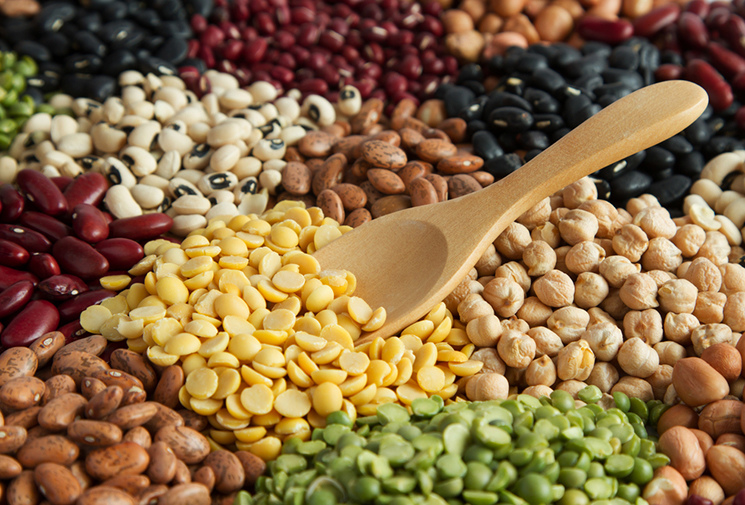Australia: fabas, lentils firm, chickpeas, mungbeans ease

Limited selling from growers has driven up prices for faba beans and lentils, while the market for chickpeas has softened on subdued demand, and mungbean values are sagging under the weight of what looks like being a big crop.
On top of logistics headaches in Melbourne and Sydney, it is access to empty containers, and shipping slots to export full ones, which continues to make bulk export a more attractive option than boxes out of south-eastern Australia.
Shipping stems for January show 25,000t of faba beans, 5000t of lentils and around 70,000t of chickpeas are loading this month, with more cargoes likely from February onward.
Focus on early bulk-shipment from New South Wales, South Australia and Victoria remains firmly fixed on barley, canola and wheat.
In Queensland, where canola is not grown, and no barley is being exported, chickpeas are running second to wheat in terms of winter-crop shipment volume.
Chickpeas
With nearby bulk export positions now covered, prices for chickpeas have softened to around $550-$570 per tonne delivered Darling Downs packer, down from a solid $570/t in mid-December.
“It’s pretty flat for the month; there’s lacklustre engagement on both sides of the equation,” Woods Grain pulse trader Steve Foran said.
Despite the large size of the Queensland and far northern NSW crop, container volumes are well down on where they were this time in the record 2016-17 season.
Exporters of chickpeas continue to focus on booking bulk parcels, even though Brisbane currently has the best container flow of any eastern Australian port and sits alongside Sydney as Australia’s main point of shipment for containerised chickpeas.
“Containers haven’t been easy.”
Faba beans
Despite Australia having just completed its biggest ever harvest of faba beans, prices have risen by up to $50/t in the past month to around $350/t delivered Wimmera packer.
“The main explanation for this is growers not liking the prices, and they have not been selling,” Agri-Oz Exports general manager Francois Darcas said.
Prior to Christmas, faba bean prices sank to domestic feed value based on a lack of demand from Egypt, Australia’s and the world’s biggest faba bean buyer.
Egypt is now buying some Australian fabas in bulk and containers, and Saudi Arabia and the United Arab Emirates have been active on containers.
Mr Darcas said logistics problems had made boxed business difficult.
“There are less containers going out because of tremendous trouble with Sydney and Melbourne, and more is being shipped in bulk from South Australia.”
Trade sources say shipping lines are offering reduced services from Australia to Asia as they redeploy vessels and containers to Northern Hemisphere routes.
“Agribusiness out of Australia is the poor cousin.”
ETG southern pulses trader Todd Krahe said Victorian growers have opted to store their faba beans and wait for market rallies, with canola and wheat bid at attractive prices comprising the bulk of their harvest sales.
“At the end of January, growers might start to think about what their fertiliser bills will look like in the lead-up to cropping this year, but no-one’s in a rush to sell now.”
Backing that off is limited interest in prompt shipment from Egypt, and container problems.
“It’s very very difficult to get confirmation on rates even for February, and that makes it hard to trade forward.”
Lentils
Lentil prices have rallied by around $30/t delivered packer in the past week after hovering around $600/t over the Christmas-New Year period, with Nipper-type lentils trading at roughly $5/t above Nugget types.
“The farmer was selling heavily into early harvest, and when the market came down, they stopped,”
Again, a lack of farmer selling in recent weeks has forced the rally.
“The farmer was selling heavily into early harvest, and when the market came down, they stopped,” Mr Darcas said.
Attractive export pricing has brought Bangladesh, India, Pakistan and the United Arab Emirates into the market, and drawn interest from Turkey.
“Lots of containers are going to the UAE and Pakistan, and some lentils are going in bulk to Egypt.”
Mr Krahe said Canadian growers have also been loath to sell at reduced rates, which has forced the market to lift its bid in order to book tonnage.
“In Canada and Australia, growers have made good returns on a lot of their crops and they’re happy to store lentils.”
Mungbeans
Prospects for Australia’s summer mungbean crop now being planted look good, and prices have factored in the likelihood of the first big crop in New South Wales and southern and central Queensland being produced in years.
Welcome rain in most growing areas has seen large areas planted on time, and fuelled the likelihood of steady exports from April to July.
Prices have consequently dropped around $50/t on all grades in the past month, with No. 1 now at $1250/t, manufacturing at $1150/t and processing at $1050/t.
“It’s a bit rare to have things looking so good,” Australian Choice Exports managing director James Hunt.
“NSW is planted, and we expect those crops will be delivered in March for April shipment, the Downs is burning diesel as we speak, and CQ’s planting window goes into the end of February.
“Some parts of CQ are too wet or too dry, but most of it is looking pretty good.”
“There’s a big crop coming.”
China continues to be the main counterparty on new-crop sales, and strong prices have encouraged growers to plant some of their summer-cropping area to mungbeans.
Tags: Australia, lentils firm, chickpeas, fabas, mungbeans ease
Read also
EU has started the process of imposing duties on Russian agricultural products
Grain prices in the world may rise as Ukraine exports all grain reserves by the en...
US and Australian experts have given conflicting forecasts for the rapeseed crop
The new EU agricultural policy should take into account Ukraine’s position
Grain exports from Ukraine exceeded 39 mln tons
Write to us
Our manager will contact you soon












